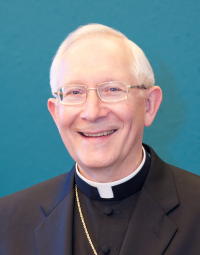
Archbishop Leonard P. Blair
As a seminarian many years ago, both philosophy and theology had pride of place in the curriculum of those being prepared for the priesthood. However, the classical philosophy that had been part of priestly training began to give way to new currents of thought in the wake of the Second Vatican Council and the upheavals in society in the 1960s. The fact that college seminarians no longer had to major in philosophy was fine with me, since I was neither drawn to it nor did I think I had much of an aptitude for it.
Now, 50 years later, I see things differently. The impact of philosophy — the beliefs, attitudes and social consequences to which it has given rise — has become glaringly apparent and deeply troubling. Debates, dissension and divisions about what a human person is, what freedom is, not to mention what the Church teaches — these are not just about theology or the authority of Scripture and tradition. What is at work is an evolution of philosophical thought that has taken hold of many, if not most, of our educational and cultural institutions, think tanks, public opinion makers and social, political and economic leadership, sometimes even among those who profess themselves to be religious.
The father of modern philosophy, Rene Descartes (1596-1650) built an account of human knowledge on the foundation of radical skepticism centered on man rather than God. Thomas Hobbes (1588-1679) made the self-interested individual the starting point of his political philosophy with only a “social contract” to protect us from one another and from chaos. Immanuel Kant (1724-1804) emphasized human autonomy in legislating one’s own morality. Friedrich Nietzsche (1844-1900) taught that the “will to power” shapes human nature and that God and Christianity are dead. And then there is Karl Marx (1818-1883) whose philosophy of revolution meant the rejection of every form of dependence, including God. It is a rejection not only of political or economic dependence, but ultimately among those who espoused his thinking, a rejection of any constraints such as those imposed by marriage and the family.
In his book Morality, the late Rabbi Jonathan Sacks says these philosophies have led us to replace “We” with “I” in almost every sphere of life. There is no moral consensus about the common good in a world in which everyone is free to pursue their own self-interest and to create their own truth, whether social, economic, political or religious. (This last is keenly felt in our Church today, something to which are Archdiocesan Synod is also meant to respond.)
The result, Sacks writes, is that we “are left in a world of relativism, nonjudgmentalism, subjectivity, autonomy, individual rights and self-esteem. … The revolutionary shift from “We” to “I” means that everything that once consecrated the moral bonds binding us to one another — faith, creed, culture, custom and convention — no longer does so. The energy now localized in the “I” has been diverted from family, congregation, and community, all of which have now grown weak, leaving us vulnerable and alone. An individualistic universe may be free but it is fraught with loneliness, isolation, vulnerability, and nihilism, a prevailing sense of the ultimate meaninglessness of life.” (p. 83)
Holy Week is all about “We” not “I”. John’s Gospel tells us that Jesus died “to gather into one the dispersed children of God.” (Jn 11:51f) Biblical references abound about the Good Shepherd’s call to be one flock; to be one family of faith, having one heart and soul and praising the Father with one voice. Christ restores our interior unity torn by our passions, and conjugal unity, the model of which is Christ and His Church. That is why the Second Vatican Council says that the Church is called to be “a sign and instrument of communion with God and the unity of the whole human race.” (LG, 42)
There can be no Easter joy in 2021 from whistling in the dark! The full power of Christ’s victory at Easter can only be under- stood when we open our eyes to the world in which we live, and the challenges we face, and the call we have by Baptism to be courageous witnesses to the truths of our faith. “God so loved he world that he gave his only Son.” We in turn must give of ourselves by a life of faith, confident that the victory is ours through the same Lord Jesus Christ.
A Happy Easter season to you all.
